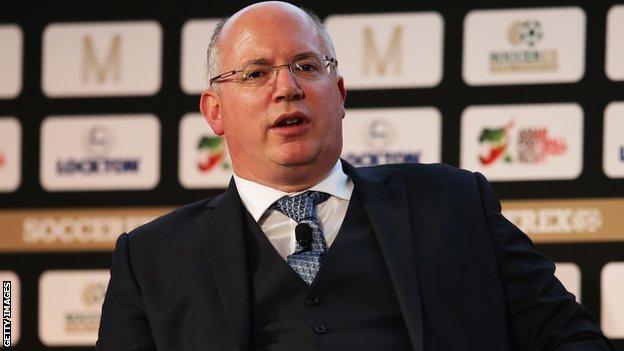English Football League: Clubs 'reliant on owners', says EFL chief
Last updated on .From the section Football

Football needs "to look at how it treats the owners at some of its clubs" as without them, fans "wouldn't have a club", says departing English Football League chief executive Shaun Harvey.
Harvey said costs across the 72 EFL sides were going up but owners were being "roughed [up] and ridiculed in certain quarters".
"Championship losses are getting bigger," he said.
"We have a business model that relies, just about, on owner funding."
Speaking to BBC Radio 5 Live's Sportsweek, he added: "Those owners are either benevolent, looking after their local clubs who they have supported for many years, or are investing to try to achieve the big prize that Aston Villa and Derby are going to play for this time."
Villa and Derby County will play in the Championship play-off final on Monday in a game Harvey said was worth £170m for whichever team won and was promoted to the Premier League.
The match will be played against the backdrop of football finance expert Kieran Maguire calculating EFL clubs "made a loss of £388m last year" - with only 19 of them making a profit.
Fans v owners in the EFL
This season has seen ownership issues at relegated Championship side Bolton Wanderers, Bury, who were promoted from League Two, and Notts County, who were relegated from League Two.
And Harvey was speaking on the day that League One side Coventry City, who have ongoing issues surrounding their home ground, said they have a "groundshare venue and agreement in place" for next season if they are unable to stay at the Ricoh Arena.
The supporters of Charlton, who play against Sunderland in the League One play-off final on Sunday, and Blackpool, who were put into receivership earlier this year, have also protested against the owners of their clubs.
- Relegated Bolton enter administration
- Bury's players urge chairman to sell
- Hardy 'regrets' buying Notts County
"The league (EFL), as it stands, will distribute more money to its clubs than ever before at about £230m," said Harvey.
"That will be across all 72 clubs - that's money that we generate and also money that we get through a deal with the Premier League, which does not include parachute payments.
"Yet in the Premier League the top 19 clubs all earned £100m and there was only one club that didn't - and I think they got £97m - so you'll forgive me for saying they all got £100m.
"So, 20 clubs, a minimum of £100m - 72 clubs sharing £230m. And, by the way, that's not done evenly either.
"So, we are reliant on owners and football needs to look at how it treats the owners at some of its clubs.
"Fans not happy about the investment that is going into their club. Trust me, without them [the owners], they wouldn't have a club."
Harvey concern at player wage inflation
Harvey has been EFL chief executive since 2013 and will leave his post next week.
He oversaw a controversial deal for domestic broadcasting rights, which several Championship clubs said left them "gravely concerned".
The unhappy clubs claimed the £595m five-year agreement with Sky Sports, which was signed in November 2018 and represented a 35% increase on the previous contract, had been done without them being fully consulted.
"After six years [in the role], the league does need to have a look at itself and decide how it's going to go forward," said Harvey.
"I think the big challenge is going to be around player wage inflation.
"How do you manage that in such a way that it doesn't take away from the quality of the product that we all want to contribute to?"






















